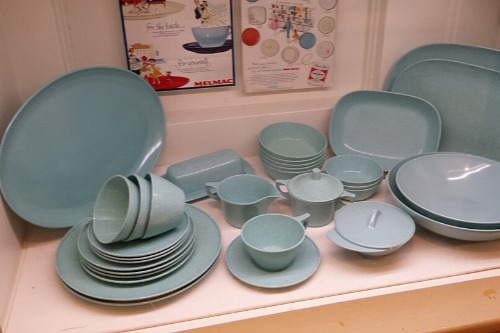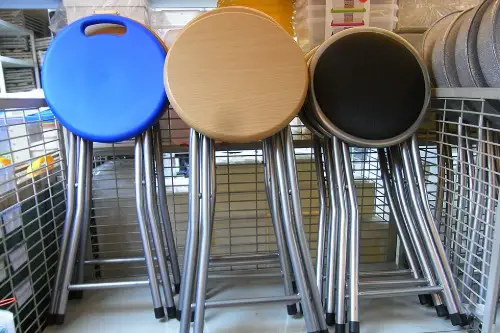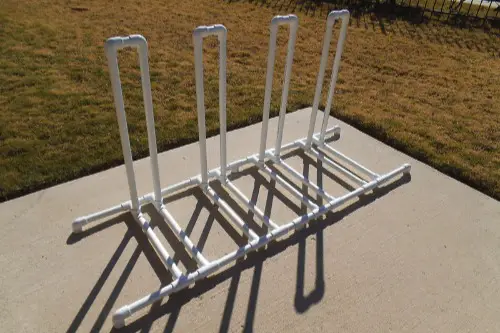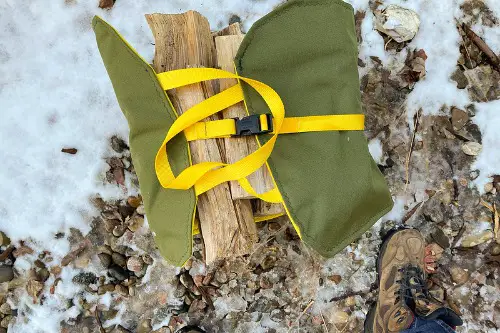1. Portable Ice Makers

A lot of RV owners buy portable ice makers thinking they’ll be essential for keeping drinks cold on hot summer days. But these machines take up a surprising amount of counter space in already cramped kitchens. They also need steady power and frequent cleaning to avoid mold buildup. Many owners end up shoving them into a cabinet or leaving them at home.
What usually happens instead is people grab a bag of ice from a gas station or campground store when they really need it. It’s cheaper, easier, and takes zero storage space inside the rig. Ice makers might feel like a luxury, but in practice they’re more hassle than help. Unless you camp off-grid for long stretches and truly need one, you’ll probably never plug it in.
2. RV-Specific Dish Sets

Those matching sets of plastic or melamine dishes labeled as “RV-friendly” look really tempting. They promise durability and a space-saving design that seems perfect for life on the road. But the truth is, regular lightweight plates, bowls, and cups from big-box stores work just as well. RV owners often regret paying extra for branded dish sets that don’t offer anything special.
The bigger issue is they’re usually heavier and bulkier than paper plates or collapsible options. Many travelers realize they’d rather not wash dishes at a campsite sink and default to disposables for convenience. So those pricey RV dish sets just end up collecting dust in the cabinets. They’re more marketing gimmick than actual necessity.
3. Satellite TV Systems

Satellite TV sounds like the ultimate way to stay entertained on the road. Companies advertise clear reception anywhere you park, as long as you have the right dish. But the setup is expensive, bulky, and often finicky, especially if you camp under trees or in remote areas. Most RV owners find it’s more trouble than it’s worth.
In reality, people now stream shows and movies from their phones, tablets, or smart TVs using campground Wi-Fi or mobile hotspots. Even DVDs end up being more reliable than fighting with a dish. Satellite TV just doesn’t fit the way most people consume entertainment anymore. It’s one of those investments that quickly feels outdated.
4. Fancy Outdoor Rugs

Outdoor RV rugs are marketed as a way to keep dirt out of the rig and make your campsite look “homey.” While they sound practical, many end up rolled up in storage bays. They’re awkward to clean, heavy when wet, and pick up more debris than they prevent. Most RV owners realize it’s easier to just sweep inside more often.
Campgrounds also vary in how much space you get, and sometimes there isn’t even room to roll out a large mat. Add in weather—wind, rain, or mud—and they become more of a nuisance than a benefit. People often buy one, use it once, then regret lugging it around. A small doormat at the steps usually does the job just fine.
5. Campfire Cooking Tripods

They look fun and rustic—hang a pot over the fire, cook like a cowboy, and impress your friends. But in practice, cooking over an open flame is messy, unpredictable, and time-consuming. Heat is hard to control, and cleaning soot-covered pots in campground sinks is a nightmare. Most RVers abandon this idea after one or two tries.
A compact propane grill or even a camp stove is easier, faster, and far less stressful. RV owners quickly learn that convenience beats novelty when you’re hungry after a long drive. Those tripods often get tossed in a storage compartment, never to see daylight again. They’re great in theory but rarely used in real camping life.
6. Extra Folding Chairs

It’s easy to imagine hosting big gatherings at the campsite and needing extra seating. That’s why many RV owners buy several folding camp chairs. But once you’re on the road, space is at a premium and most people only use two or three chairs at a time. The rest just sit in storage compartments, taking up room.
On top of that, folding chairs don’t last forever—fabric rips, frames bend, and they get dirty fast. Owners often discover they don’t need as many as they thought and regret the clutter. It’s smarter to bring just enough for the people traveling with you. Extra guests can always grab a cooler or log for seating.
7. Oversized Tool Kits

It feels responsible to be prepared with every tool imaginable for breakdowns and repairs. Many RVers buy large, heavy toolkits when they first hit the road. But most repairs either require a professional or just a few basic items like a wrench, screwdriver, and duct tape. The rest of the tools never leave their case.
Carrying an oversized toolkit also means sacrificing valuable storage weight and space. Some owners eventually pare it down to a small, customized set that actually gets used. The massive all-in-one kits usually gather dust in a storage bay. Preparation is smart, but over-preparation just leads to clutter.
8. Collapsible Buckets

Collapsible buckets seem genius at first—they flatten down and promise to help with cleaning, carrying water, or washing dishes. But most RV owners discover they rarely need a bucket at all. Freshwater hookups and gray tanks make hauling water unnecessary. And when it comes to dishes, sinks and basins work just fine.
Even when people do pull them out, collapsible buckets tend to leak or collapse at the wrong time. They’re more frustrating than helpful, so they end up forgotten in storage. Unless you’re boondocking in very remote places, they’re not worth the hassle. A small basin or even a mixing bowl does the job better.
9. RV-Specific GPS Units

Dedicated RV GPS devices are marketed to help you avoid low bridges, tight turns, and restricted roads. But most owners find their smartphones with updated map apps are more reliable. The RV units are often expensive, slow to update, and clunky to use. After a while, they get tossed in a drawer while Google Maps takes over.
Plus, newer navigation apps already allow you to customize routes, and RV forums are filled with tips for safe travel. The dedicated GPS systems feel like outdated tech in a world of smartphones. They’re another case of buying peace of mind that doesn’t actually deliver. Convenience wins again with a simple phone mount and data plan.
10. Portable Generators

Generators seem like a must-have, especially for off-grid camping. Many new RVers buy one right away, expecting to use it constantly. But unless you boondock often, most of the time you’re plugged into campground hookups where a generator is pointless. After one or two trips, it ends up being dead weight.
They’re also loud, require fuel, and need regular maintenance to keep working. Some campgrounds even ban them because of noise restrictions. RV owners often realize solar panels or just careful energy use are better solutions. The generator becomes one more unused piece of gear they regret hauling around.
11. Bike Racks Without Bikes

It sounds like a great idea: explore local trails and towns by bike while traveling. So people buy bike racks, imagining lots of scenic rides. The problem is, not everyone ends up bringing their bikes or actually using them. The rack itself then just hangs off the RV or sits in storage unused.
They also add weight, stick out awkwardly, and can rust or rattle during travel. Many owners eventually admit they don’t ride enough to justify the hassle. Walking or renting a bike when you really want one is often easier. The racks are one of those optimistic purchases that rarely pan out.
12. Specialty Cleaning Gadgets

RV supply stores are full of brushes, wands, and sprayers designed specifically for cleaning tanks, roofs, and awnings. New owners often load up on them thinking they’ll be essential. But most of the time, a standard hose, sponge, or broom works just as well. The specialty gadgets get shoved in a compartment and forgotten.
They also take up too much space for how rarely they’re used. Experienced RVers usually streamline their cleaning kit down to the basics. Spending extra money on “RV-only” tools rarely pays off. It’s one of those lessons you learn after hauling around clutter you never touch.
13. Firewood Carriers

At first, buying a canvas or nylon firewood carrier seems smart. You picture yourself hauling bundles from the campground store to your site in style. But the truth is, firewood is often sold right where you’ll burn it. Most people just carry a bundle under their arm or toss it in a bag.
The carriers also get dirty, take up space, and rarely see enough use to justify packing them. For something used only once in a while, they quickly feel unnecessary. RV owners usually end up leaving them behind after a trip or two. It’s a perfect example of a product that looks useful but isn’t in practice.
This post 13 Things RV Owners Keep Buying That They Never Actually Use was first published on Greenhouse Black.
